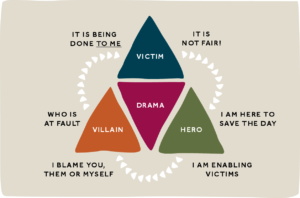I have been helping people transform their lives for two decades. There are so many lessons that I have learned about the influence, both positive and negative, that others can have on our health and wellbeing when they intersect into our lives.
While other people influence you – and we will talk about how they do that in a few moments – remember that you control the choice of how you respond to those influences. External forces become internal choices, and though it can be incredibly hard sometimes, you have the power to respond in healthy ways.
The Drama Triangle
If we forfeit the control of our choices and allow others to influence us in negative ways, we move from being fully responsible for our lives to feeling like a victim, or even like we must come in and save the day. When this happens, we become closed to new ideas, defensive in how we respond to others, and have our ego come in and have us needing to be right.
This is the Drama Triangle, a twisted cycle that keeps us from being the best versions of ourselves.

If the Drama Triangle is new to you, page 143 in Dr. A’s Habits of Health has more detail. In the meantime, here is a quick explanation:
- The Victim – The victim’s stance is “Poor me!” The victim feels oppressed, helpless, hopeless, powerless, ashamed, and is often paralyzed by inaction. The victim, if not being persecuted, will seek out a villain and a hero to save them from that villain.
- The Hero – The hero’s line is “Let me help you.” A classic enabler, the hero feels guilty if they don’t go to the rescue even though rescuing keeps victims dependent on heros. The desire to be a hero enables this individual to ignore their own anxiety and other issues.
- The Villain – The villain insists that “It’s all your fault.” They are controlling, blaming, critical, oppressive, angry, authoritative, rigid, and superior.
The temptation to live in the Drama Triangle is incredibly human. None of us are immune to it, and life will often push us in ways that make us want to retreat back to the Drama Triangle as quickly as we can.
Awareness and Power
With practice, you can become more mindful of your thoughts, feelings, and reactions to the outside world. When you sense that you are drifting toward the Drama Triangle, you can pull yourself out with Stop. Challenge. Choose.
We talked at length about strategies for making Stop. Challenge. Choose. easier for yourself, and those tips will be helpful here.
When you feel yourself tempted to become a hero or a victim or a villain, Stop. Take a few moments to think about your next choice and what you can do that aligns with your goals and who you aspire to be. Challenge yourself to make the healthier choice, and then set yourself on that path with your next action.
This isn’t always easy. In fact, sometimes it’s really hard, but with time, practice, and the support of your coach and like-minded peers, you can build this skill and enjoy the freedom of living beyond the Drama Triangle.